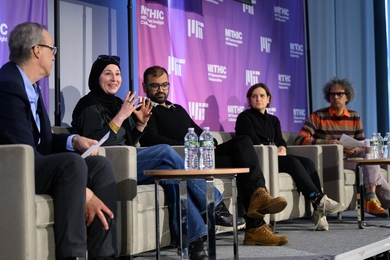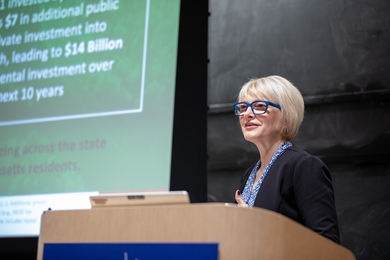iCampus projects this year include the first interactive ocean engineering lab accessible to the public, and games that can be played while pedaling a stationary bicycle.
The 2003 iCampus student project leaders gave presentations May 6 on work they have done since February. The projects will continue through 2003.
iCampus began in 1999 as a five-year research alliance between MIT and Microsoft Research to enhance university education through information technology. The innovative projects selected for funding are expected to have a significant, sustainable impact at MIT and elsewhere.
iQuarium, spearheaded by ocean engineering junior Kathryn S. Wasserman, is a colorful, interactive aquarium display screen that aims to bring hydrodynamics from the lab into the Infinite Corridor. It will feature animated swimming fish and the fluid flow in their wake. The fish will react to information from sensors about air temperature and the speed and number of passersby or even a single observer. For instance, if a group of people walk by, the fish will mimic them and swim by in a school, or a single fish might react to a single visitor by swimming up to the side of the "tank."
- Keith Winstein, a junior in electrical engineering and computer science, and freshman Joshua Mandel want to make music more readily available to MIT students. They have been working since last year on LAMP (Library Access to Music Project), through which MIT students can request on the web one of hundreds of electronically stored CDs. The user would hear the music through one of the 16 TV channels that MIT Cable has made available to LAMP.
- Mars Gravity Biosatellite is a student-led project spread across three universities and two continents that's working to design, build, launch and recover a low-Earth-orbiting satellite to study the effects of Martian-level gravity on mammals. Sophomores Audrey M. Schaffer of aeronautics and astronautics and Ryan A. Damico of electrical engineering and computer science are working on a "distributed collaboration system" with students at the University of Washington and the University of Queensland. The system will allow real-time access to information, scheduling and task tracking and face-to-face communication for team members at all three universities.
- The aim of Cyclescore, created by Sloan School graduate student Joseph Heitzeberg, is to see what motivational experiences are most effective for aerobic exercise machines. CycleScore will connect exercise bikes to a PC and a monitor to measure the effects of certain motivational experiences, such as games where users try to increase their scores, on people's exercise habits.
- iLabNotebook, an electronic laboratory notebook, would allow researchers to enter descriptions of experimental setups, data, chemical formulae, etc., as well as daily records of experiments on TabletPCs powered by Microsoft Windows XP. Mechanical engineering graduate student Patrick A. Anquetil says iLabNotebook would be better than a paper notebook because it could provide a centralized, streamlined information system to aid scientists as they acquire, store and distribute information.
A version of this article appeared in MIT Tech Talk on May 14, 2003.





